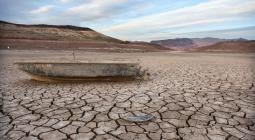World ‘not prepared’ for climate disasters after warmest ever January
Effect of El Niño phenomenon combined with human-driven global heating is causing increasing alarm among scientists
From deadly floods in California to devastating fires in Chile, scientists say the world is not prepared for the climate disasters that are hitting with increasing frequency as human-driven global heating continues to break records.
The hottest year in history has been followed by the warmest ever January. Many regions in the northern hemisphere are sweltering in heatwaves that would be more normal in June. Marine scientists are shocked by the prolonged and intense heat at the surface of the oceans.
Scientists say the extreme heat is mostly the result of human activity, such as the burning of oil, gas and coal and the cutting down of forests. This has been amplified by natural factors, particularly the El Niño – a phenomenon associated with Pacific Ocean warming – that started last year and is expected to continue until spring at the earliest.
This year has a one in three chance of being even hotter than last year’s record, according to the US’s National Oceanic and Atmospheric Administration.
The higher the global temperature, the greater the risk of fires and flooding. This month alone has seen two grim records of such climate-related disasters.
The Chilean president, Gabriel Boric, has declared two days of national mourning after the country’s deadliest ever forest fires claimed more than 120 lives in the Valparaíso region. This follows a decade-long drought in the area and a shift from diverse natural forests, which are more resilient to fire, to monoculture plantations, which are more vulnerable.
In the US, the governor of California, Gavin Newsom, announced a state of emergency as an “atmospheric river” – which was supercharged by the unusually warm Pacific Ocean – dumped unprecedented amounts of rain on San Diego and neighbouring districts, killing at least three people.
Attribution studies will be needed to ascertain the precise extent to which these particular calamities were drive by human-driven climate disruption, but they are in line with a broader trend towards increasingly severe impacts.
“Fuelled by extreme weather and climate extremes, the frequency of climate-related disasters has dramatically risen in recent years,” said Raul Cordero, a climate professor at the University of Groningen and the University of Santiago. “In some regions of the world, we are facing climate-fuelled disasters for which we are not prepared, and it is unlikely that we will be able to fully adapt to them.”
Richard Betts, of the Met Office’s Hadley Centre in the UK, said many extremes, including longer heatwaves, heavier rainfall, increased drought and more fire weather, were becoming more severe due to human-caused climate change.
“We can still limit the extent to which extremes get worse if we urgently reduce greenhouse gas emissions to net zero – but with global emissions still rising, it’s hard not to be increasingly concerned about how we will deal with what’s coming,” Betts said. “We already need to adapt to the changes that we’ve already caused, and adaptation will become increasingly difficult the longer we leave it to reduce emissions.”
Of prime concern is what is happening to the oceans, which cover 71% of the planet and absorb most of the excess heat from global warming. In a letter published in the journal Advances in Atmospheric Science last month, a group of scientists warned that sea surface temperatures last year were “off the chart”, with dire implications for atmospheric regulation and storm intensity.
“Warm oceans intensify atmospheric circulation and associated extreme events,” said Francisco Eliseu Aquino, the deputy director of Brazil’s Polar and Climate Centre. “The record temperature and extreme events observed on the planet in 2023 have not passed. The planet has not cooled down.”
Francesca Guglielmo, a senior scientist at the EU’s Copernicus satellite monitoring service, said 2024 had started as 2023 ended, with “exceptional temperatures and many extreme events”. She pointed to a recent forecast by the Barcelona Supercomputing Center that suggested there was a good chance that 2024 would set a new record with global temperatures passing 1.5C above pre-industrial levels for the first time.
Guglielmo said scientists were now considering risks that had been unthinkable until recently. “2023 has broken so many records that a number of new hypotheses, including the dawn of a new phase in the global warming rate, have been floated. These hypotheses were not nearly as prevalent a year ago.”
Cover photo: A man crosses a flooded street in Santa Barbara, California, on 4 February 2024. Photograph: Erick Madrid/EPA



